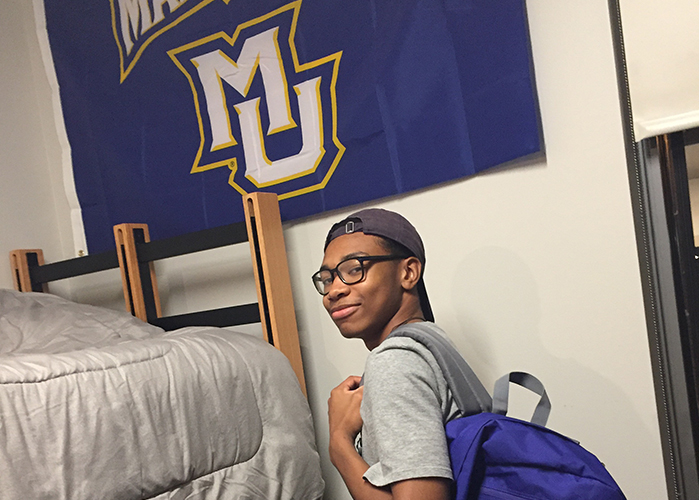|
|
High School
|
College
|
|
Classes
|
- Most classes are arranged for you.
- Teachers record attendance carefully.
- Classes tend to meet Mon.–Fri.
- Class sizes tend to not exceed 35 students.
- Knowing what it takes to graduate is not fully your responsibility.
|
- You select your classes and arrange your schedules through a meeting with your adviser.
- Professors may choose to not take official attendance, but they will usually know if you have not been showing up to class.
- Some classes meet Mon., Wed. and Fri., others meet Tues. and Thurs., and some can meet once or four times per week.
- Class sizes will vary. Some will be large lectures of around 150 students, while others will be small seminars of 10 or less.
- Graduation requirements differ for different majors, and they may change during your stay at Marquette. You are expected to know the requirements that apply to you.
|
|
Teaching
|
- Teachers are trained to teach students.
- Teachers tend to provide you with information you missed when you were absent.
- Teachers present material to help you understand the textbook.
- Teachers tend to write important information on the board to help students take notes.
- Teachers tend to remind you of important dates for tests or different assignments.
|
- Professors are experts in their areas of research and may use a teaching style different to the one you are used to.
- You are expected to get notes from lectures you missed from classmates.
- Professors may frequently deviate from the textbook. They may supplement the textbook with their lectures, which tend to be influenced by their own areas of research.
- It is expected that you draw connections between the lectures and the textbook readings.
- Professors may lecture without pausing. You are expected to understand which points are the most important.
- Notes written on the board are not typically used to summarize the lecture.
- You are expected to consult the course syllabus to know what is expected of you, due dates on assignments, test dates and the way you will be graded.
|
|
Studying
|
- You may study outside of class for a few hours each week, and much of that time may be dedicated to last-minute test preparation.
- You may need to only go over class materials once in order to learn all that you need to know about them.
- You are usually told what to focus on in assigned readings.
|
- For every credit hour, you need to study at least two to three hours outside of class. Ex. For a 3-credit course, you are expected to study/do course work for six to nine hours every week.
- Even if you do not have a homework assignment, you are expected to regularly engage the class material outside of class.
- You must review class notes and read the text regularly.
- You are expected to read and understand the assigned readings. Professors assume that you have already done the reading before each lecture.
|
|
Tests
|
- Testing tends to be frequent.
- Small amounts of material are covered in each test.
- Makeup tests are usually available.
- Teachers tend to hold review sessions and provide comprehensive study guides.
- You are usually expected to simply reproduce what you have been taught.
|
- Testing tends to be infrequent and tends to cover large amounts of material.
- Make-up tests tend to be unavailable. You need to carefully read the syllabus to know if make-up exams are an option. It is up to you to contact your professor about make-up exams.
- Review sessions are rarely offered, and if they are, you are expected to actively participate.
- For some courses, tutoring is the best option for extra review.
- You are expected to know the material and apply it to new situations and problems beyond what you have been taught in lectures and the textbook.
|
|
Grades
|
- Grades are provided for most assigned work.
- Good homework grades may help raise your overall grades when you receive a low score on tests, papers or quizzes.
- Extra credit is often available.
- Early assignments may not impact your final grade as much as final assignments.
- Teachers tend to inform you quickly if you are receiving low grades.
|
- Grades may not be provided for all assigned work.
- Major papers and tests are the most impactful on your final grade, and homework may not significantly help your grade if you score low on a paper or a test.
- First tests tend to be as important as tests later in the semester. If you are not prepared for your first tests because you are banking on being able to make up for it later in the semester with other tests, you are in for a rough awakening.
- If you are failing, the professor may not let you know at all, and you will only find out when grades are officially reported. If you are in doubt of your grades, and if grades are not updated on D2L, then it is up to you to consult your professor directly during office hours or by email.
|
|
General
|
- Your hand tends to be held in high school.
- At times, you are treated like an adult, and at other times you are still treated like a child.
- Information tends to be provided for you.
|
- You are treated like an adult.
- You are expected to find information, whether that is by consulting your syllabus or contacting your professor.
- You are responsible for nearly every facet of work outside of the class —working with partners or groups, studying, reviewing, establishing clear communication with professors, etc.
|
